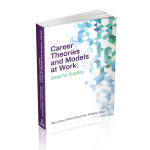When I studied my first course in career development, I remember being overwhelmed by the number of – and variation in – career theories and doubting their utility. What I really wanted to know was how to help people with learning and work decisions. I wondered if I really needed to know or remember much about career theory after I passed my courses and began to practice.
Now, after many years of practising career development in different settings, as well as researching, writing and teaching about career theory, I have come to appreciate theory and what it offers practitioners. However, I still see students and practitioners with the same concerns and doubts as those I had when I first began in the field. They face the unenviable task of trying to understand how career theory applies to their work with clients. They wonder, “does theory really matter to practice?” In my opinion, yes, it does matter, and I’d like to share some of my thoughts about why.
‘Witness accounts’ of career development

Relevance to practice
Beyond the model- and theory-specific applications offered by their developers and proponents, is there anything else that theory offers practice? In my opinion, the practical implications of theory can considered from six broad perspectives.
- The process of career decision-making: Since the earliest work in our field, career development practitioners have used a model of career decision-making based on self-knowledge and world of work knowledge. This model is referred to as a matching model. In practice, most career development practitioners will understand the need to assist their clients to become more self-aware and to direct them to relevant career and occupational information in order to make an informed career choice.
- The process of career development: Some career theories provide explanations of the process of career development through age-related stages, from childhood to late adulthood. In practice, the blueprint frameworks that have been published in countries such as Canada and Australia to guide the work of career development practitioners identify age/stage-appropriate career competencies that clients can learn or develop through career education, career programs or career counselling.
- Career assessment: Career assessment has been a defining feature of career development since its early beginnings. Based on theories relating to personal attributes such as personality, interests and values, career assessment instruments such as surveys and questionnaires help clients develop their self-knowledge. The results of such assessments can then be matched to the factors required in occupations to assist in career decision-making. Some career theories may be applied in practice using qualitative career assessment instruments that help people tell their career stories and, ultimately, make career decisions. In practice, many career development practitioners use some form of career assessment instruments in their practice.
- Case conceptualization: Career theories offer practitioners ways of considering (‘witnessing’) cases from a range of angles and thus, considering different interventions that may be helpful to clients. In practice, there is no one way to conceptualize a case and practitioners who are familiar with a number of theories and models can consider their cases from different angles.
- Context and culture: Career development practitioners work in different settings and serve different client groups and have become increasingly aware of how clients’ cultures and context influence their career development. A number of career theories and models explain these influences from different perspectives and emphasize how to take context and culture into account in practice.
- Professionalism: In some countries such as Canada and Australia, professional standards have been developed to guide career practitioner training and practice based on a set of competencies that career development practitioners should possess. One such competency is knowledge of career development theory and an ability to apply it. This competency distinguishes career development from other professions and provides a foundation for practice.
I think that these six perspectives, in addition to the theory and model specific examples contained in the 43 chapters of Career Theories and Models at Work: Ideas for Practice, demonstrate why career theory matters to practice. I hope that this book will spark not only your interest in career theory but also give you concrete examples of how career theory matters to, and can be applied, in practice.







